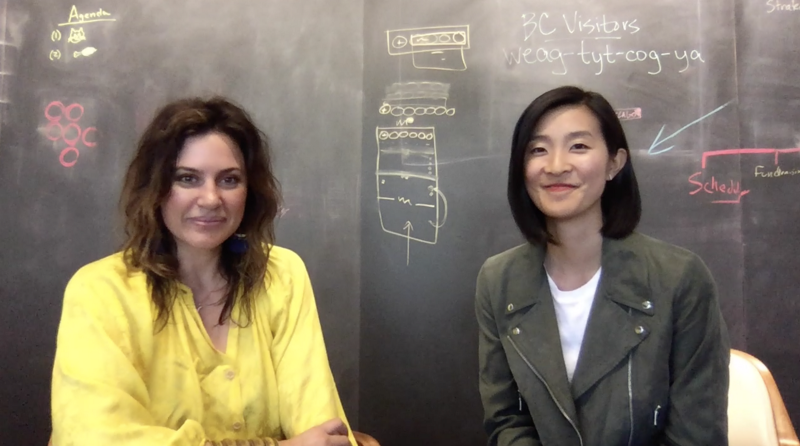As the creator of a luxury chocolate empire exceeding $35MM annually, Katrina shares insights on what not to forget as a leader.
Every few weeks as part of The Heartbeat, I asks one question to a founder, CEO, or business owner I respect about their biggest leadership lesson learned.
Katrina Markoff is the Founder and CEO of Vosges Haut-Chocolat, an international chocolate company that exceeds $35MM in revenue annually. Katrina has been featured on the Food Network, not to mention countless
Claire: Hi, everyone. I’m Claire Lew and I’m the CEO of Know Your Company. Today I am thrilled to have with me the one and only Katrina Markoff.
If any of you have ever heard or eaten Vosges chocolate which I have in my kitchen all the time — this is my favorite bar — Katrina is the founder and chocolatier of this amazing brand.
She studied in Paris and built this company from the ground up. It’s all about this ethos of being able to travel, in many ways, when you eat chocolate. You can find her chocolate in, obviously, high end boutiques all across the world, but I think the thing that’s really unique about what you do too is you also make it very accessible. You actually have locations at O’Hare International Airport. You distribute your bars also through Whole Foods.
And then something that I actually learned today that I had no idea about is, she recently launched a new brand of chocolate called Wild Ophelia and all the proceeds go towards an accelerator that they have for young women entrepreneurs in high school that are in food businesses.
Katrina: High school and college.
Claire: Absolutely amazing. I know you’ve also been on the Food Network and in all these publications. Katrina is the real deal. She’s based here in Chicago. I’m lucky to know her and I admire you a lot.
Katrina: Thank you so much, Claire.
Claire: Oh, my gosh, of course.
Katrina: It’s great to do this.
Claire: I’ve got this one question to ask you, Katrina, about leadership and that is, what’s one thing you wish you would have learned earlier as a leader?
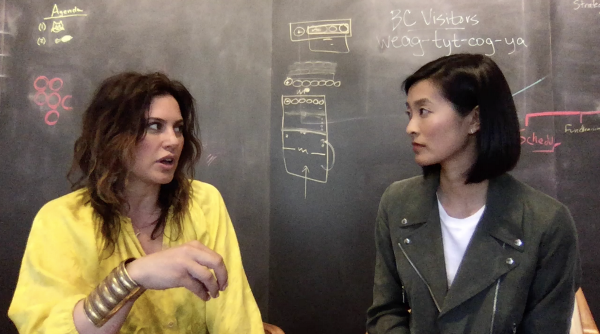
Katrina: I think the importance of staying really close to your leadership team, really aligned and really close. As your business grows from entrepreneurial startup to much bigger, wider teams, you’re pulled. I’m pulled so much as the founder and the face of the brand into being PR focused and speaking focused and whatnot. And I would say, it took me a lot out of the company and I am naturally an introvert.
Claire: Oh, really? I would never have guessed that. Me too.
Katrina: So I’ve learned through bumps and hills and valleys that you can’t lose that connection with your team because it’s so often they’re working for you, for your vision. That connectivity to you is part of the reason they’re there.
So as you get drawn more and more out, you have to remember how do you connect again.
That is in ways of lunch or getting feedback or social outings with your team. I think that’s important, not to lose sight of that. It seems maybe that’s obvious, but actually –
Claire: It’s hard.
Katrina: … it’s hard.
Claire: It might be obvious, to your point, but it’s hard in practice. I think everyone who’s watching this is probably nodding their heads going, “Oh, yeah, as a CEO or as a leader being out, doing, speaking, being out promoting, etc, you forget to reconnect with the team. For you though, how big is your leadership team? How many people do you have? How big is actually Vosges as a company right now?
Katrina: We probably have around 100 employees and it flexes up depending on the seasonality because we make a lot of chocolate during the holidays and so it goes up. But in reverse, it’s the core group of leaders in the organization, maybe there’s eight to 10, but those are very important eight to 10 people that need to feel like they’re important to you. I had kids too which is a whole other level of distraction from being a founder, single, then got married, then had kids. All that stuff is taking that part of you. I think the more you can set up those connection points with your team and also, of course, hire the right people who are very entrepreneurial in nature, as I like to say, or take a lot of initiative, more the type that maybe you need to pull the reins, but less that you have to push up the hill and that need a lot of feedback from you to make those decisions. Figuring out how you change your team over the time of your life with the business and its initiation stages to the more mature space.
Claire: Absolutely. No, that makes so much sense. I have a million questions I want to ask you.
Claire: The first part is around, you’re talking about connection points, building connection points. So when you were saying, “Oh, it could be as simple as lunch.” Is there anything you do particularly right now with the Vosges leadership team that might be considered counterintuitive about connection points or what do you try to do as a leader to make sure you’re staying in contact with folks?
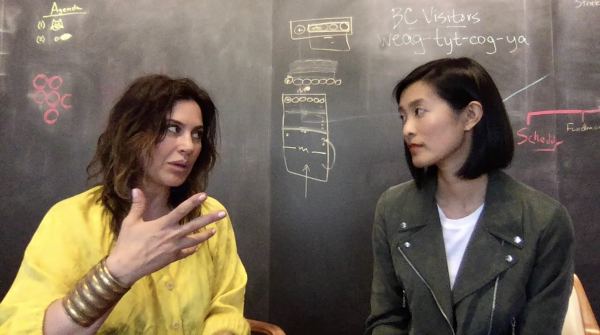
Katrina: One of the things I’ve been doing lately is really having the level playing field conversations like, “Please give me feedback. What are your ideas? How could we make this better? You tell me, give me feedback. Please give me feedback. What do I need to be doing better?” Because I think the more down to earth and approachable they think you are, the better it can gel. I don’t like top down organizations. People that are on the floor making the chocolates to people that are running those teams, they see so much that I don’t see as much anymore. I worked in every area before which is super helpful to know how everything works, but then you get a little bit distance so you need to get their feedback and how can they feel comfortable giving you that information.
Katrina:
Sometimes having these titles makes people feel like they’re so much further away from you than truly they are. Just really approaching it on a human level like, “How are we doing this together? Let’s figure this out.” I think that empowers people when they know they have a voice to you, especially with people that are new.
And also with all the new hires now, I’m spending time with them, just even 15 minutes the first or second week it’s like sharing my vision, getting to know who they are, what are their interests and really trying to connect so there feels like there’s a trust.
Claire: Absolutely. Well, I think one benefit that you probably have in building that trust is, you do run a chocolate … how many of us run a chocolate company in the sense of the vision that everyone is gathering around and excited about is pretty aligned. Do you ever find any challenges though in the sense that because it’s food, because it’s chocolate, which is so pleasurable and won- … I mean, chocolate’s one of my biggest loves in life. Do you find any tension around the fact that, “We are running a chocolate company, but at the same time, how do we make sure everyone is one the same page. I’m curious about that.
Katrina: When you first start, there’s chocolate everywhere and it’s really fun, but it’s definitely a business too. It’s really fun, but it’s like how are we really focusing on the goals for each channel because there’s so many channels within the business. It’s fairly complicated in that way because we manufacture in-house, we do sell to other retailers like the Whole Foods of the world and Kroger’s. Then we have our own retail boutiques and we have our own e-commerce and we have our own business development, own hospitality and events, now we’re opening up our Chocolate Temple to the public. So there’s a lot of complexity which makes for a really beautiful deep brand with a lot of story, but also complexity.
Claire: It’s almost like seven different businesses that you just described to me.
Katrina: Seven different little businesses.
Claire: Absolutely. One of the things that you also mentioned too in managing that complexity is, you were saying, emphasizing the important of who you hire. And I loved what you said about finding people who you have to pull the reins back on instead of push up the hill. Can you tell me a little bit about that? When did you realize that was important? Did something happen or-
Katrina: Yeah. I would say when I first started, I remember thinking, “Well, we couldn’t really afford to hire people that were too expensive. So we would hire-
Claire: I think we can all relate to that, all of us watching this.
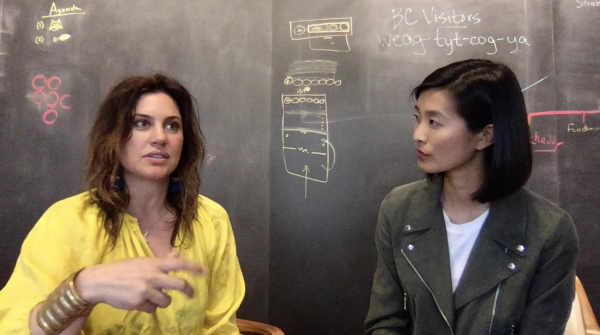
Katrina: You’re building a brand and there wasn’t this huge foodie movement when I started and now it’s pretty sexy being in the food business. In the beginning, it was just like really working side by side with them and showing them and then having them do it as opposed to necessarily hiring expertise that I was going to learn from and that was going to take off and just go. I think as we got bigger and I couldn’t be in all the areas, it seemed clear to me that it was more and more important that people were driving it, that were taking the reins and doing it. I’m not the best at hiring, I’d say it’s not my skill set. Recently, a woman who’s just been an inadvertent mentor/angel decided to lean in and help me. She literally helped me hire the last three or four people and she’s really good at it. So one of the things.
Claire: What does she do that you don’t do?
Katrina: She has an innate… I don’t know, ability of how to judge people and ask questions and know who’s good. In many cases, I probably wouldn’t have hired the people she selected and they’ve been rock stars. So it’s very clear to me that it’s not my forte to hire people. That’s okay.
You have to know, probably almost more important, is to know what you’re not good at than what you’re good. You kind of already know what you’re good at.
Claire: Absolutely. I love that.
Katrina: And you can’t be good at everything. If you know someone who’s quite good at doing something you have a deficit in, ask them to help, however. In this case, this woman was so generous. She’s like, “Just throw me a chocolate party, somewhere I’ll help you out.” I’m like, “Oh, are you kidding?” Angels show up all the time and she’s definitely one of them.
Claire: That’s amazing. I think what you said about knowing what you’re not good at is almost more important than knowing what you are good at. I think that’s such an important piece of wisdom. Also, hard to do, right?
Katrina: That’s true.
Claire: Talk to me about, do you have to swallow your pride when you do that? How do you keep that in check because I think for a lot of leaders, we know what we’re good at. I don’t know if we always know what we’re not good at.
Katrina: And the thing is, you always have to have a strong face for your board, for investors, for the press, whatever. It’s very atypical to feel safe around saying what you’re not good at.
Claire: Like the fact that you said, “I’m not good at hiring,” and you’re a CEO. No, no, no, I just mean like that’s refreshing. That’s super refreshing.
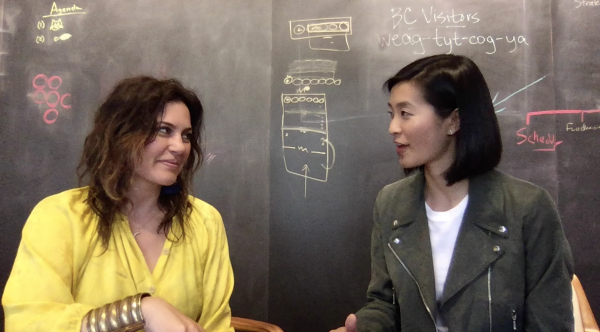
Katrina: And it’s real. At a certain point, when your company gets to a certain level too, you’ve got to really know that clearly because, in my case, I’m good at getting it from zero to 30ish million, but to get from 30 to 100 is a whole different game. In fact, what I find now is that I’m setting myself up to go back to my roots which is my sweet spot which is really creating the vision, the story, the product, being the faith, those kinds of things that no one really else can do and building a team around innovation and stuff like that. Then it creates a bigger and broader group that can do what I do too. Yeah, you know when you get to these different levels, how you reassess.
Because, in the beginning, you have to be good at everything. But then, at some point, you have to say, “Really, I’m best at this and next level, I need these types of people to fill in my gaps.
Claire: Absolutely. And I think there’s something really interesting in the beginning, you have to be good at everything, but not necessarily great. Then when you get to a certain level, then you have to be actually great and world class in a few specific areas. It’s very difficult to be great and world class in everything. That’s when you need to find those people and admit to yourself, “Okay, I’m strong in this, I’m strong, I’m not.” I’m curious, for you, how do you keep that check? Do you have a person you talk to be like, “Hey, can you keep me grounded about what I’m not good at,” or is it your leadership team that keeps you in check. Is there something personally that you do and ask yourself questions. Is it an executive coach or is it a peer group?
Katrina: I’ve had all of it. I’ve had coaches, I’ve had peer groups, I’ve had my husband give me a lot of feedback. And you know, frankly, I’m fairly self critical so I have a pretty good sense of that.
Claire: We don’t need more of that.
Katrina: I’m pretty hard on myself, but where I have a ton of fire and a ton of confidence is where I know that’s my strength because it just naturally comes up and I can naturally be very strong about my opinions and I know that where there’s passion, there’s usually magnetism and there’s usually something right about that. And I’m super intuitive. I’ve been like that this whole time, about this brand. I think when I veered off from being intuitive is when I’ve made mistakes.
Claire: Interesting.
Katrina:
Whether it’s all these people that seem to be much smarter than me in X, Y, Z and referring to data and whatnot. It’s good to a point, but at the end of the day, intuition has to be the lead. And you have to be confident in your commitment to that. Because, in the end, that’s the thing that makes us very different from AI, very different from the computers of the world. It’s something that is a sense that humans have that we must continue to honor.
Claire: Absolutely. Thank you so much for encouraging us to listen to ourselves, to trust that intuition. I think a lot of reason why people would even watch videos like this and like The Heartbeat is because they think, “Oh, someone else has the right answer. There’s some advice out there that’s good.” And, it’s the case.
Katrina: And, it’s inside.
Claire: It’s inside. One of my favorite quick, I don’t know if you said this, but it’s just the thing I always repeat to myself is that, “Everything you think you need, you already have.”
Katrina: Exactly.
Claire: It’s all inside.
Katrina: And trust the universe.
Claire: Exactly. Well, Katrina, thank you so much for sharing your wisdom with all of us.
Katrina: Thank you.
Claire: I know we’re all walking away just reminding ourselves to think about maybe the things we’re not good at, but also at the same time, to listen to ourselves a little bit more.
Katrina: Absolutely.
Claire: Thank you so much again. And for those of you who haven’t eaten any Vosges yet today, maybe now is a good time.
Katrina: Thank you.
